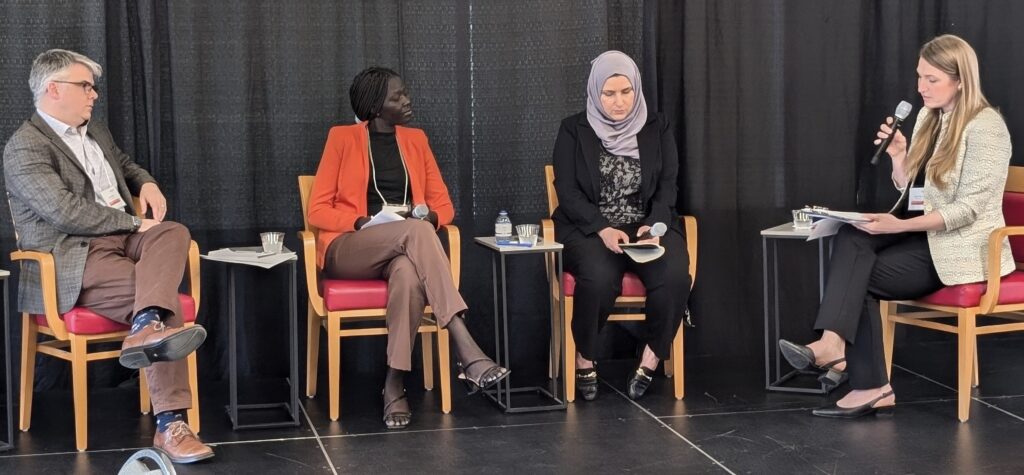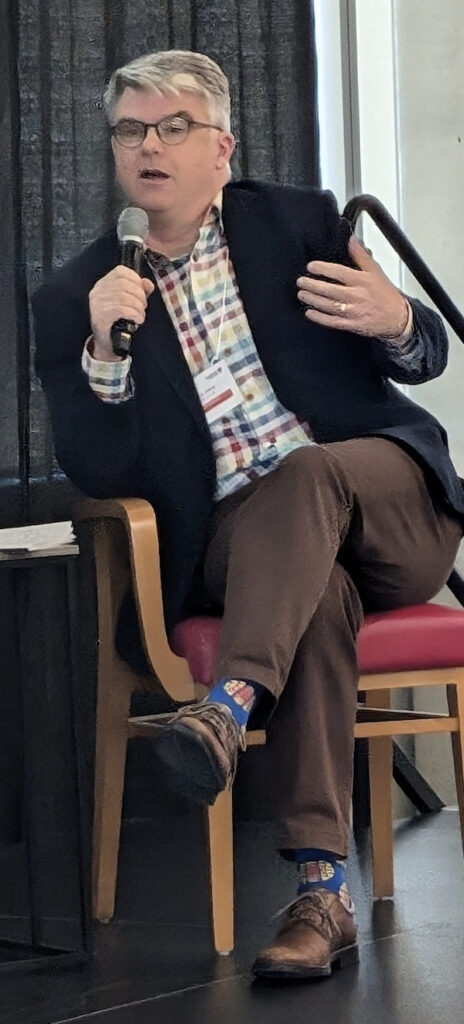
With more refugees arriving in Canada through complex and evolving immigration pathways, panelists at the Safe Havens and Knowledge Networks in Canada conference are urging a coordinated national response by postsecondary institutions and governments to address the systemic barriers refugees face and to provide better support for displaced students and scholars.
“It’s not in the absence of goodwill,” said Carleton University political science professor James Milner, who also serves as Director of Migration and Diaspora Studies. “The goodwill is there, but it’s really recognizing that this is something that cannot be responded to equitably in a just way if it remains episodic and apocryphal.”
Milner and two other participants in the May 23 panel discussion, Northpine Foundation refugee advocate Bayan Khatib and refugee-focused filmmaker Nyabuol Biel Gang, highlighted the need for Canadian universities to use their existing resources to adapt support for refugees navigating the “maze” of systems currently in place.
Last year, Milner was named Canada’s first Sergio Vieira de Mello Chair, a prestigious UN-backed position that fosters research, advocacy and policy change in support of forcibly displaced people. Vieira de Mello was a UN refugee advocate who died with 22 colleagues in 2003 when a United Nations compound in Baghdad was attacked.

Milner said his experience supporting graduate students in the university administration process has given him a first-hand understanding of the bureaucratic systems in place for displaced people.
“Someone who’s in the process of seeking asylum versus someone who’s arrived with PR (Permanent Residence) status, the institutional systems often hear the word refugee, hear the word displaced, and there are assumptions about what that means,” said Milner. “Either the trope of vulnerability and infantilizing experience you clearly don’t understand, or a view of suspicion, a view of aversion.”
Milner compared the support given to Ukrainians versus that given to Syrians or Afghans, saying that “an individual with a similar profile but a different nationality gets access to very different sets of opportunities.”
Khatib echoed such concerns.
“Our solutions that we have in Canada, which are well suited to the government-assisted, privately sponsored, are no longer working,” said Khatib, voicing her consternation with the current systems in place nationally.
Khatib is the Impact Director of the Refugee Portfolio at Northpine Foundation and the co-founder of the Syrian Canadian Foundation, which has programs that create a network of support for newcomers in Canada. The foundation also works to support displaced individuals and give them connections into Canadian society.
Khatib explained that many refugee claimants now receive temporary residence visas (TRVs), a pathway that effectively bars them from receiving post-secondary education.
“When it comes to the university space, refugees that are not arriving with permanent residency status, like the government-assisted, privately sponsored, do not have access to university because they have to pay international fees and not domestic fees,” said Khatib.
Refugees are often arriving in Canada without housing, financial security or recognized credentials.
‘When it comes to the university space, refugees that are not arriving with permanent residency status . . . do not have access to university because they have to pay international fees and not domestic fees.”
— Bayan Khatib, refugee advocate, Northpine Foundation
“A refugee claimant and the TRV — which are the largest number of refugees arriving here — usually cannot access university,” continued Khatib.
To move beyond what Milner described as “episodic” and “siloed” services which are currently offered in Canada, the panelists suggested Canadian universities develop their current resources and collaborate with each other and with refugees, treating them as partners rather than victims.
“This key point that I want us to take away — not just from this panel but from this whole conference — is shifting the paradigm of thinking of those who experience displacement as being victims to being partners,” said Milner.
“Often at the global meetings in Geneva, it will be, ‘Come in and tell your story. Thank you so much, you’ve inspired us, now get off the stage and let the experts come and sit. We’ll figure it out.’”
Milner says there should be a partnership between institutions and refugees, whom he believes are truly the experts when it comes to their own experience.
“The fact is that it’s the expertise that comes from the refugee girl child who’s figured it out. That’s the expertise. Taking that paradigm and saying, how does that little shift condition the way we as institutions think?” said Milner, “It’s not institutions providing something to. It’s institutions being willing to partner with.”
Nyabuol Biel Gang is a global international studies student at Carleton, a member of the Refugee Education Council for Canada’s Minister of International Development and a filmmaker. Her films have been featured by Human Rights Watch, the Refugee Education Council of Canada and the University of Toronto Human Rights Film Festival.
‘Universities, even during tough times, have incredible resources. I’m interested in seeing what people put some thought into — what resources can be utilized to create the supports that refugees need to thrive in this environment.’
— Nyabuol Biel Gang, filmmaker and refugee advocate
“I’m saying this as a storyteller and as a filmmaker. I think it’s very important that we get to hear these stories . . . (by) those with lived experience because I think (there’s) a need for us to move beyond data and actually bring the people with lived experience to Canada, in classrooms, where people are talking,” said Gang.
The panelists expressed agreement that universities don’t need to create new services, but tailor existing resources to support refugees, as well.
“I want to see that someone, an institution, is willing to put skin in the game, is willing to utilize their existing resources,” said Gang. “Universities, even during tough times, have incredible resources. I’m interested in seeing what people put some thought into — what resources can be utilized to create the supports that refugees need to thrive in this environment.”
Gang and the others said money is an issue for many refugees, but it isn’t the only factor making post-secondary education hard for refugees.
“The money is important, but it’s not just the money,” said Gang. “I have seen refugees get accepted into the top university in this country and then leave and go to a much less prestigious university or college because they just couldn’t fit in. It was too hard an environment. There weren’t the supports needed. That’s what I’m looking for.”
She added: “Who’s willing? Who cares enough to put that in and to utilize their existing resources to get it done?”
Milner added that universities cannot treat the challenges as an opportunity to compete with each other, but rather to collaborate.
“Different universities bring different value-added in different kinds of programs just by virtue of, you know, the strengths of different universities,” he said. “At the core of it is to incentivize universities to not think about this as something that’s additional, that people do off the corner of their desks, but to fundamentally recognize this is part of the mandate of a public university, right? This is not an additional extra piece of charity, but this is part of the DNA.”


